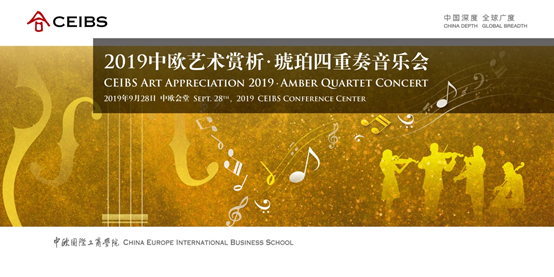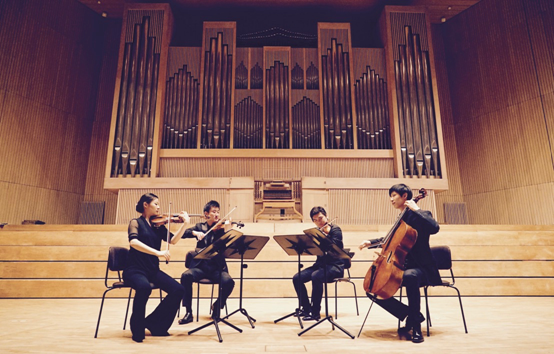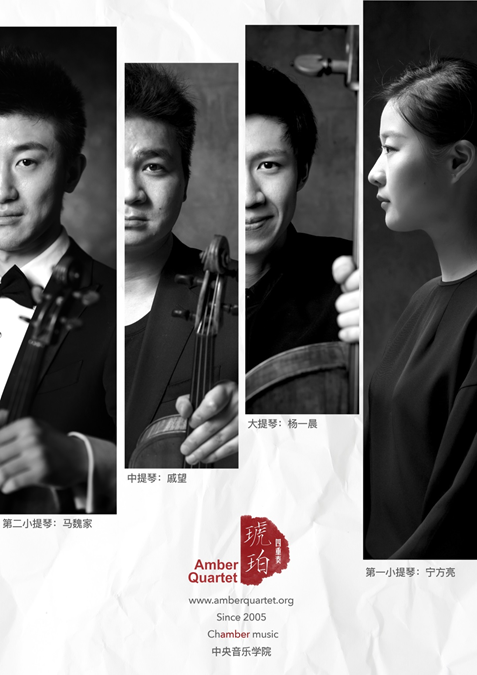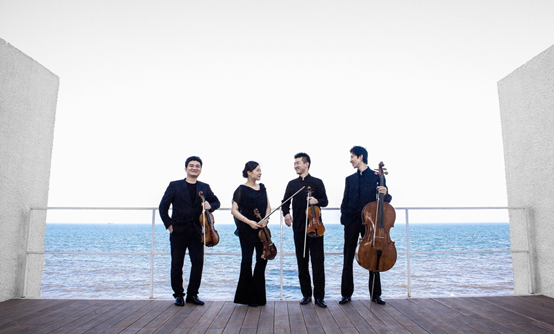CEIBS Art Appreciation 2019· Amber Quartet Concert

This autumn, CEIBS will invite the renowned Amber Quartet to present a string quartet concert at Shanghai campus. As our art appreciation series events, the musicians will not only play the works of Beethoven, Mendelssohn, Bartok and Wang Liping, but will also give an appreciation with their extensive musical knowledge, to lead you to the world of classical music.

Amber Quartet founded in 2005 at the Central Conservatory of Music, the Amber Quartet, who represents the highest level of chamber music in China, has created history of Chinese chamber music for multiple time: the first Chinese chamber ensemble winning the highest award in an international chamber music competition, the first and only Chinese inheritor of the legendary Alban Berg Quartet, the first public-funded Chinese chamber ensemble entering the Instituto Internacional de Música de Cámara at the Escuela Superior de Musica Reina Sofia de Madrid and graduating with full credit, the first and only Chinese chamber ensemble invited by the renowned McGill International String Quartet Academy (MISQA), and the first professional string quartet listed in China National Art Foundation.
The Amber Quartet has also received interviews by numerous medias worldwide, such as the flagship music magazine "The Strad", Xinhua News Agency, China National Radio, Australia ABC Radio, Australia SBS Radio, Spain National Radio, Oberösterreichische Rundschau, Spain Euro-Chinese Times, Beijing News, Guangzhou Daily, Music Times, Club Magazine, etc.

The Amber Quartet has also devoted to academic and research field and they were proved to be capable and visionary. The Amber Quartet has performed over one hundred works of string quartet covering the history of Western music for over four hundred years. Meanwhile, the Amber Quartet pays great attention on promoting Chinese chamber compositions. In recent years, the Amber Quartet has collaborated with composers and musicians in traditional Chinese music and premiered many chamber works that combine Western and Eastern elements. In 2018, the Amber Quartet and Professor Lan Pan in musicology from Central Conservatory of Music co-founded the innovative key research project Deep Integration of Performance and Theory. Based on the high-level musicality and academic achievement, the Amber Quartet was selected in the 2019 Youth Talent Funding Program of China National Art Foundation.
Members of the Amber Quartet have multiple achievements in music education. Fangliang Ning, Wang Qi, Yichen Yang are formal teachers at Central Conservatory of Music in chamber music and string performance. Starting from 2015 they have taught over forty students who won awards in various chamber and solo competitions. Besides regular teaching, they encouraged and led students in public welfare activities including High-end Music Entering College benefit concert and benefit lectures at NCPA, which received positive social responses. Members of the Amber Quartet have committed themselves to the popularization of classical music through Amber Quartet Concert Plus, an integrated and creative lecture-concert series aiming at fostering mass audience to appreciate classical music.

The Amber Quartet studied under Professor Yun Chen and Professor Bing Yu from Central Conservatory of Music, and Professor Günter Pichler from Alban Berg Quartet in Spain. The Amber Quartet was also coached by a number of world-renowned chamber artists including Gerhard Schulz, Valentin Erben, Michael Tree, Harald Schoneweg, Wolfgang Jahn, Hanxiang Gong, etc.
Members of the Amber Quartet perform on four ancient Italian instruments generously loaned by Hong Kong China Foundation. The renowned French case manufacture BAM has generously sponsored the Amber Quartet with their instrument cases. Starting from 2018, the Amber Quartet has signed with the publisher G. Henle and adopted its free score support service.
Brief Introduction of Performers
NING Fangliang
A gold award winner of 2011 CCTV Violin Competition, National Scholarship, Wu Fengzhou Scholarship, Albeniz Scholarship.
Ms. Ning was an apprentice of Professor Lin Yaoji, Professor Xue Wei, and Professor Günter Pichler.
Ms. Ning was educated at The Middle School Affiliated to Central Conservatory of Music, Central Conservatory of Music (CCOM), after that she was admitted by the graduate college of CCOM with test and fee waive. She had acted as the concertmaster of China Youth Symphony Orchestra and Seiji Ozawa Music Academy, and was described by Seiji Ozawa as “an extraordinarily talented and outstanding concertmaster”. Ms. Ning was rewarded First Class Scholarship and Excellent Musician Scholarship, as well as been guided and praised by domestic and foreign musicians including Zukerman and Midori.
Ms. Ning has attained remarkable achievements in both solo and chamber. As the first violin, she founded Amber Quartet and Dacapo Piano Trio in 2005.
In 2013, Amber Quartet won “the grand prize”, “first prize string quartets” and “best interpretation and performance of post 1993 work” these three awards of in “2013 ASIA-PACIFIC Chamber Music Competition”, Amber Quartet becomes the first Chinese quartet winning the grand prize at international chamber music competition. Lorin Maazel is highly appreciated Amber quartet after listening their performance: “Amber quartet …a remarkable ensemble!” As the first chamber music group with government funded oversea study, Amber quartet has been enrolled by The International Institute of Chamber Music of Madrid in 2013, and gained full scholarship form the College.
Ms. Ning owns rich performance experiences and as a collaborator, she has performed with the Prof. Charles Neidich , pianist Du Taihang, violinist Chen Yun, violist Su Zhen, cellist Zhu Yibin, German violinist Mathias Boegner, conductor Semyon Bychkov, Seiji Ozawa, Gerd Albrecht and other well-known musicians. As for modern music, she released the world premiere of Sound of Tree by Finnish composer Mikko Heini and The Third Suite for Piano Trio.
MA Weijia
In 2004, it was admitted to the Middle School of Central Conservatory of Music in China. In 2007, he was admitted to Central Conservatory of Music. The teacher was from Professor Liang Danan. 2009 - 2011 is the chief of the Chinese Youth Symphony Orchestra. In 2013, it was admitted to the National Conservatory of music in Dresden, Germany, with Professor Igor Malinovsky and a master's degree in 2015.
In 2005, he participated in the creation of "Amber Quartet" and served second violins for seven years. The former Berlin Philharmonic Orchestra chief Rainer Kussmaul praised it as "the best second violin."
Since 2011, he has worked in the first violin of the orchestra of China National Grand Theater, and has performed more than 20 operas, as well as many symphony concerts and chamber music concerts.
QI Wang
Qi Wang, was born in a musical family. He studied viola at the Central Conservatory of Music China from 2003 to 2007.
Graduated from the Central Conservatory of Music in 2007 and obtained a bachelor's degree.He has twice winning the China International Viola Competition.
From 2007 to 2011 he was studying in the University of the Arts in Berlin, Germany, and obtained the degree of Master and soloist.
While studying in Germany, he was once a member of the Berlin Philharmonic internship.He played the String Quartet in five years.
YANG Yichen
Yang Yichen was born in Beijing in 1988 and his native place is Taiwan. He was born into a family of music tradition and his grandfather is composer Jiang Wenye. From 1999 to 2007, he was admitted by the primary school and the middle school affiliated to Central Conservatory of Music and then Central Conservatory of Music (CCOM) by getting first place in all the relevant entrance examinations. In 2010, by excellent academic results, he was admitted by the graduate college of CCOM. Mr. Yang studies with Prof. Song Tao and Prof. Zhu Yibing successively.
Mr. Yang’s musical talent was obvious at a young age and debuted when he was only 6. At the age of 14, he was acted as a soloist in collaboration with Xiamen Symphony Orchestra to perform Dmitry Kabalevsky’s Cello Concerto.
Mr.Yang has attained remarkable achievements in both solo and chamber. As a core member, he founded Amber Quartet and Dacapo Piano Trio in 2005.
In 2013, Amber Quartet won “the grand prize”,“first prize string quartets” and “best interpretation and performance of post 1993 work” these three grand awards of in “2013 ASIA-PACIFIC Chamber Music Competition”, Amber Quartet becomes the first Chinese quartet winning the grand prize at international chamber music competition. In 2011, Amber Quartet won the silver medal of Gold Bell Music Award, and first prize in 2nd Chamber Competition of CCOM.
As the first chamber music group with government funded oversea study, Amber quartet has been enrolled by The International Institute of Chamber Music of Madrid in 2013, and gained full scholarship form the College. Amber quartet started to study professional quartet following the previous Vienna philharmonic orchestra chief, the first violin of Alban Berg Quartet Mr. Günter Pichler.
Dacapo Piano Trio won gold medal in Cuellar-Nathan Chamber Competition of CCOM and won praise of Menahem Pressler, the chair of the jury. Mr.Yang is also the founding member of China Cello Philharmonic. Since 2005, they have given nearly 300 performances throughout the municipal concerts and institutions of higher education. In 2010, they were invited to the Netherland Cello Biennale.
Mr.Yang widely-admired performance were throughout Japan, Korea, Australia and National Centre for the Performing Arts, Beijing Concert Hall, Shanghai Grand Theatre, Shanghai Concert Hall, Xiamen Hongtai Concert Hall, Xing Hai Concert Hall, Beijing Zhong Shan Music Hall and Italy and Poland embassy to China and many colleges.
Program
- Conon Johann Pachelbel
- Sunrise Joseph Haydn
- String Quartet Op.135 Ludwig van Beethoven
- String Quartet No.6 IN f Minor Felix Mendelssohn
- Romanian Folk Dances BélaB artók
- Buried flowers Fantasy Liping Wang
- la Murte del angel Astor Piazzolla
Note: CEIBS Alumni Relations Office reserves the final rights to interpret relevant regulations.










